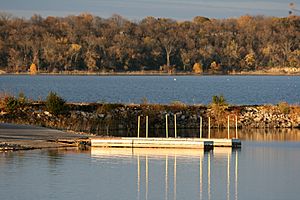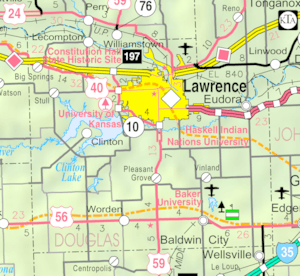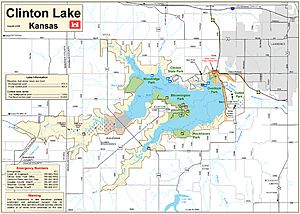Clinton Lake (Kansas) facts for kids
Quick facts for kids Clinton Lake |
|
|---|---|

Clinton Lake
|
|

|
|
| Location | Douglas County, Kansas |
| Coordinates | 38°55′15″N 95°19′47″W / 38.92083°N 95.32972°W |
| Type | Reservoir |
| Primary inflows | Wakarusa River, Rock Creek, Deer Creek |
| Primary outflows | Wakarusa River |
| Catchment area | 367 sq mi (950 km2) |
| Basin countries | United States |
| Managing agency | U.S. Army Corps of Engineers |
| Built | 1975 |
| Max. length | 9,550 ft (2,910 m) |
| Max. width | 940 ft (290 m) |
| Surface area | 7,000 acres (28 km2) |
| Average depth | 7 ft (2.1 m) |
| Max. depth | 55 ft (17 m) |
| Water volume | 110,400 acre⋅ft (0.1362 km3) |
| Shore length1 | 85 miles (137 km) |
| Surface elevation | 875.5 ft (266.9 m) |
| Settlements | Lawrence, Kansas |
| 1 Shore length is not a well-defined measure. | |

Clinton Lake is a reservoir on the southwestern part of Lawrence, Kansas. The lake was created by Clinton Dam being built. The 35 square miles (91 km²) of land and water is maintained by the U.S. Army Corps of Engineers.
Hydrology
Clinton Lake is formed mostly by the Wakarusa River coming east from Shawnee County. The Wakarusa River goes through the Clinton Dam. It stays south of Lawrence, and it continues east to the Kansas River near Eudora. Main tributaries include Deer Creek, Rock Creek, Washington Creek, Dry Creek, Coon Creek and Camp Creek.
Cities along or near Clinton Lake include Clinton, Stull and Lawrence.
Natural history
The woods around the lake have many white tail deer, quail, wild turkey, doves, rabbits, and squirrels. Bald eagles, great blue heron, gulls, cormorants, and various types of birds that travel. This includes American white pelicans and Canada geese. They can be seen above and around the lake at different times of the year. Clinton Lake also has many fish.

